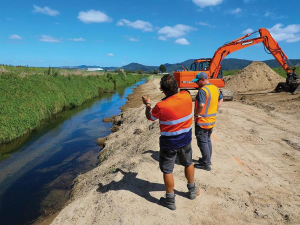University offers rural catchment solutions
A key element in Massey University’s research programme is its Farmed Landscapes Research Centre (FLRC).
 Established in 2017, the community-based advisory groups are designed to connect the Regional Councils with the communities that benefit from the work the Regional Council delivers to maintain and improve the rivers and drainage schemes.
Established in 2017, the community-based advisory groups are designed to connect the Regional Councils with the communities that benefit from the work the Regional Council delivers to maintain and improve the rivers and drainage schemes.
Bay of Plenty Regional Council Toi Moana is seeking applications from rivers and drainage scheme ratepayers to join its Rivers Scheme Advisory Groups.
There are four Advisory Groups to represent the four major rivers and one drainage scheme in the region: Kaituna Catchment Control Scheme, Rangitaiki-Tarawera Rivers Scheme, Rangitāiki Drainage Scheme, Whakatāne-Tauranga Rivers Scheme, and Waioeka-Otara Rivers Scheme.
Established in 2017, the community-based advisory groups are designed to connect the Regional Councils with the communities that benefit from the work the Regional Council delivers to maintain and improve the rivers and drainage schemes.
“Advisory Group members provide a critical link between the community and Regional Council rivers and drainage staff and councillors, as well as involving councillors and staff from local territorial authorities, and tangata whenua,” says Bay of Plenty Regional Council Toi Moana general manager integrated catchments, Chris Ingle.
Successful applicants will be appointed to their Rivers Scheme Advisory Group for a (minimum) three-year term, with meetings held twice a year in March and September.
Ingle says the Advisory Group meetings are an opportunity for members to ask questions of the council team, provide feedback on behalf of the community and share insights into what the community is thinking and feeling.
There are six positions available within each Advisory Group, with an urban / rural split based on rate take for the area – for example, the Waioeka-Otara Rivers Scheme Advisory Group has higher representation of rural members as it has more rural ratepayers in the scheme.
Ingle says the Regional Council wants to hear from applicants who are passionate about where they live, who want to form or further a relationship with their local council staff and councillors, and who bring a wealth of knowledge to the table.
“These Advisory Groups are created for community,” he says. “If you, or someone you know, would be a suitable applicant, we encourage you to put yourself forward.
“We’d also like to acknowledge those who have given their time to be representatives for their area over the past six years, and thank them for their support and commitment to open and constructive dialogue with our councillors and staff. Existing advisory group members are also eligible to re-apply,” Ingle says.
Application are open through to Tuesday 30 January. All applications will be considered by representative councillors before successful appointments are made in February.
Former Fonterra executive Alex Turnbull has been appointed CEO to lead all five Yili Oceania Business Division companies in New Zealand.
Fonterra executive René Dedoncker is leaving the co-operative later this year to lead Australian agribusiness Elders.
Alliance Group and the Southland Stags rugby team have joined forces in a partnership that will see the the meat co-operative's farmgate brand feature on players' team kits and replica jerseys.
Fonterra's plan to expand its organic programme to the South Island is being well received by farmers, the co-op says.
Voting has started for the renewal of DairyNZ's milksolids levy.
The most successful catchment groups in NZ are those that have 'a source to sea' approach.

OPINION: Here w go: the election date is set for November 7 and the politicians are out of the gate…
OPINION: ECan data was released a few days ago showing Canterbury farmers have made “giant strides on environmental performance”.